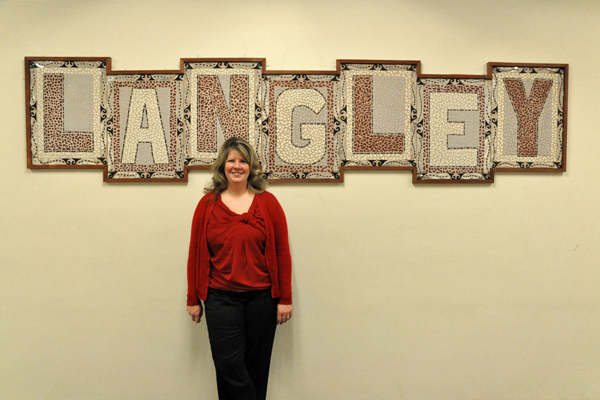
Top Teachers: Students will thank these Pittsburgh educators now, not just later
If you were fortunate enough to have a teacher who gave you the love of reading (thanks, Mrs. Donaldson) or helped you overcome a fear of fractions (much appreciated, Mr. Kestner), then you know the impact a great instructor can have on a young adult. Here are five such teachers cultivating lifelong learners in the Pittsburgh region.
Karen Arnold, Pittsburgh Langley High School
“Where’s your permission slip?” Karen Arnold asks Langley freshman Serenity Scott. “Do I have to call mom again?”
“No!” Scott says, sheepish grin on her face. “I’ll get it.”
“Saying you’ll get it and me actually getting it are two different things, my love,” Arnold says.
Arnold is teacher, parent and buddy to Langley students. The former English instructor became a Learning Environment Specialist in 2011-12, working to improve teacher effectiveness and ensure students feel comfortable as they transition to a new school in 2012-13.
“Since Langley is moving to Brashear, we take field trips there and we have to shadow a student,” Scott says. “Most Langley kids were uncomfortable with it, but Ms. Arnold made sure everything fit into place and everyone was comfortable.”
Shifting Langley students to Brashear High school, part of Pittsburgh Public Schools’ plan to cut costs and limit empty classroom seats, is a challenge. Students worry about transportation, bigger class sizes and getting along with kids at Brashear, Arnold says.
To ease those worries, Arnold plans student focus groups, a transition activity night for Brashear extracurriculars and even a Langley-Brashear cookout.
“They ask what can they do to make [the transition] smoother and make us feel better about it,” Scott says. “It helps.”
Putting students at ease and in a position to thrive starts with making personal connections, Arnold says. It’s a lesson she learned from her own English teacher, Gail Wilson.
“Make every kid in your building feel like the most important kid every day, even if it’s just for 10 seconds,” Arnold says. “I talk about their clothes or say, ‘Great shoes.’ I’m also the athletic director and they know I watch Sports Center, so they’ll come in and talk about that. You create rapport with them some when they have a problem, they’ll come talk to you.”
“The relationship is cool,” says senior Eric Montgomery, a football player for the Mustangs. “Instead of going home angry, you talk to Ms. Arnold and she’ll help you gather your thoughts.”
Rowland Bynum, Pittsburgh Perry High School
In first grade, Rowland Bynum sketched pictures of his two dream jobs – teacher and doctor. For Bynum, the son and nephew of Pittsburgh Public Schools teachers, becoming an educator seemed like a natural fit.
“But I went to Penn State for pre-med, and I ended up changing my major many times,” Bynum says. “I was walking on Beaver Avenue one day and I thought, ‘Maybe I should go back to teaching.’”
Bynum helps Perry chemistry students discover their own paths. Rather than lecturing until kids’ eyes glaze over, Bynum starts class with warm-up exercises prepared by students. If they studied, say, quantum numbers the day before, their job is to come in with questions for the class and then find answers among themselves.
Following warm-ups, students do lab work in pairs or small groups. After making sure students are following safety procedures and giving some tips, Bynum lets students take over.
“I like how we interact with each other,” says sophomore Adasia Jennings. “It’s not all book work all the time.”
Letting students become teachers boosts confidence, says sophomore Joseph Salmon.
“What makes him a great teacher is that he lets us experiment on our own,” Salmon says. ‘He gives us a feeling of independence and lets us know we can do it on our own.”
Cultivating critical thinking skills is the key to success in college and the work force, Bynum says.
“If they read a passage, I want them to figure out what’s important,” Bynum says. “That’s my thing: I want them to think for themselves.”
But for Bynum, who has instructed several of his godchildren over the years, teaching is still a family affair.
“Kids nowadays, they’re dealing with so many different issues,” Bynum says. “I try to reach out to kids. Sometimes they need money for lunch. I’ll give them money for lunch. Or money for the bus after school – I’ll do that. You want to be part of their lives.”
Having that personal relationship makes students more willing to open up, says sophomore Rosie Williams.
“If we have a problem, he’ll bring us out in the hallway and talk one-on-one instead of just sending us out,” Williams says. “He always tells us stuff about his family, so we’re comfortable around him.”
Mike Carlin, Mt. Lebanon High School
Facebook pages, parties and the Seven Deadly Sins – all things typically frowned upon by teachers. But at Mt. Lebanon, they’re signs of Mike Carlin’s impact on his art students.
Carlin’s open-door policy (students are welcome to paint in the hall or sculpt in the ceramic studio when they have free time) and blending of other school subjects creates a community of artists, complete with an art club Facebook page, art parties and original works done with greater historical and scientific context.
Stephen Keiser, a senior, uses the Facebook page to find out about upcoming art critiques. “They help me see aspects of my painting I hadn’t seen before,” Keiser says. Students who wouldn’t otherwise interact come together in the art wing, he adds.
“It’s a subculture of the school,” Carlin says. “At first they want to divide themselves into little cliques, but the artwork they create bridges that gap eventually.”
Carlin gives his AP Studio Art class conceptual prompts, like the Seven Deadly Sins or “I Am Become Death – The Destroyer of Worlds” (the Bhagavad Gita text spoken by Dr. Robert Oppenheimer upon witnessing the first atomic bomb), and lets their imaginations take over from there.
“I love how he always has literary references and poetry to inspire you,” says senior Katrina Duperee. “We’re always learning different parts of history and science, not just arts.”
“Oftentimes people think art is a separate category, but it embraces almost all other subjects,” Carlin says. “When we fire pieces in the kiln, they have to learn about quartz inversion. When we study pigments in a painting, that’s the periodic chart.”
Keiser thinks Carlin’s interdisciplinary style will help him study graphic design in college.
“Being able to take a simple sentence and turn it into an actual piece will help, because graphic designers take a client’s idea and create something that fits that vision,” Keiser says.
“I love watching them grow – from thinking they don’t have that ability to then seeing they have these uncovered talents,” Carlin says.
And for students who have talent in spades? They’ve been known to move to the district just to learn under Mike Carlin. He’s that good.
Anne Paolicelli, Pittsburgh CAPA 6-12
A trained dancer, Anne Paolicelli gained an appreciation for the arts at Rogers Middle School, which later merged with CAPA. She learned to take risks and how to win – and lose – gracefully.
Now that the ninth and eleventh-grade English teacher is up for a national teaching award, she wants to give other children those experiences.
Paolicelli is one of four finalists for the “Great American Teach-Off,” which awards a $10,000 school grant to the nation’s most innovative teacher. If she wins, Paolicelli hopes to develop a program where CAPA students work with adjunct professors to teach their craft to elementary students who don’t currently have art programs.
“I want to pay it forward,” Paolicelli says. “In arts classes students express themselves, work with each other and mess up, and see how failure can lead to a new idea or success. That’s what learning is: finding a new way to think or approach an idea.”
Paolicelli’s teaching ideas involve taking sometimes-stuffy subjects and letting students live the parts of the characters.
“When we read The Odyssey, we wrapped ourselves up in blankets and had a toga party while reading poems we wrote,” says CAPA freshman Alex Howard.
He also developed his own play for A Midsummer Night’s Dream, remaking trickster Puck into a robot con artist. “That was a really fun day,” Howard says. “It was helpful in understanding the characters and acting itself. That’s not something every teacher does.”
Nicole Conrad, a freshman dance major to whom Paolicelli taught tap, enjoys when students research a portion of a work and teach their peers. For Shakespeare, they each researched an aspect of British theater.
“I understood what it felt like for people watching the play, and I got more into the story and understood what the author was thinking,” Conrad says.
Conrad thinks teaching elementary-school children would benefit CAPA students, too.
“It would make us appreciate our art forms more and be grateful for what we have,” she says.
“Watching [students] create something and then seeing their vision come to life?” Paolicelli says.
“It’s the coolest thing ever.”
Rhonda Threet, Pittsburgh King Pre-K-8
Before Rhonda Threet could help her first-graders conquer their fears, she had to overcome her own.
Threet was part of Langley High School’s first teaching academy, designed to give students the skills to pursue teaching degrees in college. “But after taking some methods classes at Pitt,” Threet says, “I got a little nervous and thought, ‘Hmm, I don’t know if this is something I can be successful in.’”
Her post-college experience as a program director for Community Outreach Ministries, a nonprofit that had after-school and summer activities with Pittsburgh Public Schools, changed her mind. “Just having that small role and providing support there … I said, ‘I have to put aside my fears and do this.”
Threet encourages her kids to go beyond their comfort zones.
“She pushes us to learn,” says Tyara. “When I have an attitude, she makes sure I don’t give up.”
D’Andre, proudly toting his math booklet, agrees. “She helps us figure out our questions and circles ones we need to fix,” he says. “I like math now.”
“She builds positive relationships with each of her students and their families,” says Pittsburgh King Co-principal Jennifer Mikula. “She creates a classroom of high expectations.”
In Threet’s classroom, active bodies promote active brains.
“I try to be entertaining and not monotone,” she says. “I allow them to stand up and do different chants – like ‘Good job, good job, G-double-O-D good job!’ Children are social beings. Just now, students were leading the math routine. They love being in front of the classroom and teaching their peers – even six-year-olds!”
Threet, who also mentors colleagues at the school’s new teaching institute, wants students to know success doesn’t always come easy.
“I want them to understand the importance of grappling through things,” she says. “They’re in a safe place – safe to make mistakes and take risks.”
“When I get frustrated,” Tyara says, “I just keep on trying.”
Have a recommendation for a top teacher? Email us here.
Photographs of (top to bottom) Rowland Bynum, Karen Arnold, Mike Carlin, Anne Paolicelli and Rhonda Threet copyright Brian Cohen




